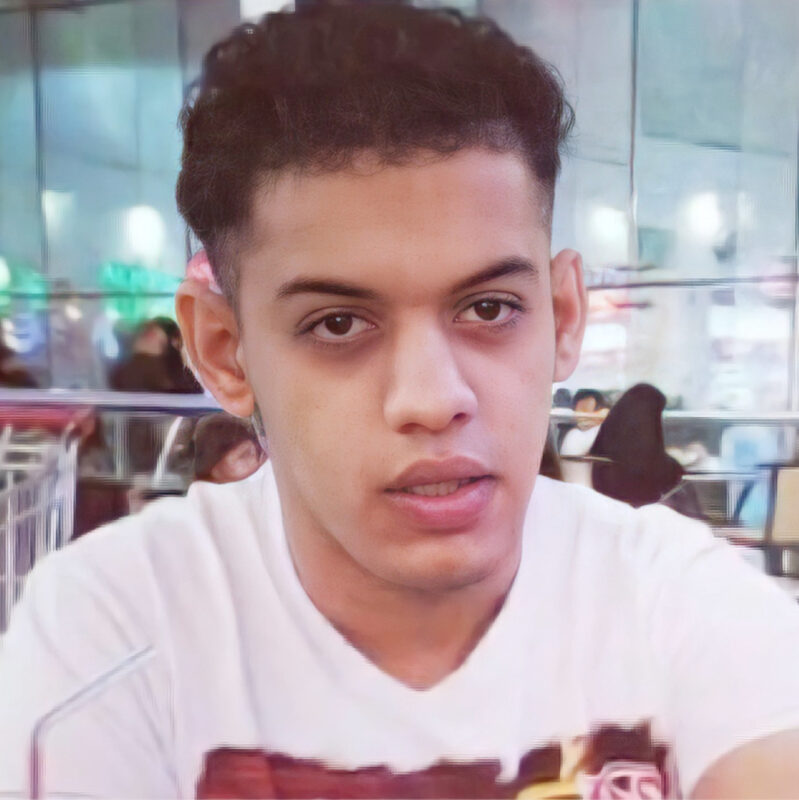Currently, Jalal Labbad is sentenced to death for crimes committed when he was a juvenile. Jalal is a young man who represents critical issues concerning human rights, legal fairness and the treatment of religious minorities in Saudi Arabia. His case embodies the harsh and unjust application of the death penalty in Saudi Arabia.
Jalal Labbad, born in 1995, is a Saudi national who actively participated in demonstrations between 2011 and 2012, at the age of seventeen, protesting the treatment of the Shia minority in Al-Qatif. These protests were part of a broader movement against the oppressive actions of the Saudi government. Labbad, who was still a minor during these protests, was subsequently targeted by authorities for his involvement. On February 23, 2017, Labbad was arrested at his family home by security forces. The arrest was carried out without a warrant. This marked the beginning of a legal journey, characterised by severe torture and prolonged periods of solitary confinement.
From the moment of arrest, Labbad was subjected to horrific conditions. He was isolated from the outside world and deprived of his right to legal counsel. He reports being held in solitary confinement for over nine months. He was tortured for confessions and, through beatings, the use of electric shocks, suffocation and other psychological torture mechanisms, they attempted to manipulate and undermine his morale. This prolonged torture has had a detrimental effect on Labbad’s condition. The torture led him to be hospitalized on multiple occasions and has left after-effects such as a weak heartbeat, and frequent fainting… causing chronic conditions, loss of concentration, and persistent forgetfulness.
Despite clear indicators of the use of torture in his imprisonment, this was ignored in a judicial process that can only be defined as flawed, wrongful, and unfair. On January 24, 2019, the prosecution requested the hudud penalty for hirabah against him on various charges, some of which date back to when he was a minor. These charges included participating in demonstrations, attending funerals of victims killed by government forces, helping wanted persons, and being involved in the case of the abduction and murder of Sheikh Mohammed al-Jirani, despite the lack of concrete evidence of his involvement. In July 2019, Labbad appeared before the Specialized Criminal Court, accused, among other charges, of participating in demonstrations at the age of 15. On July 31, 2022, the Court sentenced Labbad to death. Finally, on October 13, 2023, the Saudi Arabian Supreme Court secretly confirmed Labbad’s death sentence without notifying his family or legal representatives. This places Labbad at imminent risk of execution.
Jalal Labbad’s case represents a flaw in Saudi Arabia’s justice system. Saudi Arabia has repeatedly stated that it does not apply the death penalty to minors; abolishing in 2020 the death penalty for accused minors through a Royal Decree, limiting the maximum sentence to ten years in a juvenile detention center. Despite these statements, children and individuals who committed crimes as minors continue to face executions.
An important factor allowing for the continued execution of juveniles is the distinction between Ta’zir, Qisas and Hudud offences in Islamic Sharia law. Offences categorized as hudud or visas can still be punishable by the death penalty, which the Royal Decree sought to abolish for juveniles. By reclassifying certain offences from Ta’zir to Hudud, the Saudi government has overpowered the decree, maintaining the death penalty.
Jalal’s warrantless arrest, torture, enforced disappearance, solitary confinement, and unfair trial are violations of the Convention Against Torture and Other Cruel, Inhuman or Degrading Treatment or Punishment (CAT), to which Saudi Arabia is a party. Additionally, these violations, committed against him as a minor, contravene the Convention on the Rights of the Child (CRC), to which Saudi Arabia is also a party.
As such, Americans for Democracy & Human Rights in Bahrain (ADHRB) highlights the imminent risk that Jalal and other detainees will be executed for crimes allegedly committed when they were minors. ADHRB calls on the international community to take immediate action and pressure the Saudi government to cancel the death sentences imposed on all minors in Saudi Arabia. Furthermore, ADHRB urges the Saudi authorities to immediately release Jalal due to the absence of a fair trial associated with the lack of appropriate legal actions. ADHRB also calls for an investigation into the allegations of torture, enforced disappearance, solitary confinement and ill-treatment, to hold perpetrators accountable. Finally, ADHRB calls on Saudi Arabia to provide Jalal with compensation for the violations he has suffered, or at the very least, a fair retrial leading to his release.





